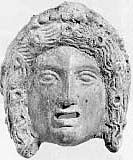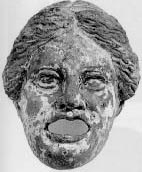|
|

|
|
|
|
||
|
|

|
|
|
|

|
|
|
|
||
|
|

|
|
Click ![]() to return to menu
to return to menu
Return to Comic Spirit Syllabus
Menander redivivus |
|
|
|
Now Aristophanes is neither pleasing to the many nor endurable to the thoughtful, but his poetry is like a harlot who has passed her prime and then takes up the role of a wife, whose presumption the many cannot endure and whose licentiousness and malice the dignified abominate. But Menander, along with his charm, shows himself above all satisfying. He has made his poetry, of all the beautiful works Greece has produced, the most generally accepted subject in theatres, in discussions and at banquets, for readings, for instruction and for dramatic competitions. . . For what reason, in fact, is it truly worth while for an educated man to go the theatre, except to enjoy Menander. (appended to Plutarch, Mor., X [853-54] ) |
|
|
Despite the accolades of ancient critics, Menander's work was virtually lost to us until papyri containing scenes and parts of scenes were discovered in the early years of this century. Perhaps the most fantastic find (1959) was a papyrus containing almost a complete play, heretofore unrecovered, "The Grumpy Old Man" (Dyskolos). |
|
|
The modern response to Menander has been somewhat less enthusiastic than that of the ancients. Menander's art, however, can best be appreciated by setting it in the context of Menander's Athens, rather than by comparing his comedy directly to Aristophanes'. |
Menander's Athens |
|
|
385 BCE |
|
|
c.342 |
|
|
338 |
|
|
336-323 |
|
|
322 |
|
|
315-309 |
|
|
291 |
|
|
So. . . . |
How does Menander's Athens give us insight into Menander's comic drama?
|
Menander's comic stage |
|
|---|---|
|
|
|
|
|
|
|
|
|
ACT I |
|
||
|
ACT II |
|
||
|
ACT III |
|
||
|
ACT IV |
|
||
|
ACT V |
|
||
|
Some closing comments and questions for further consideration |
|
For further reading:
Arnott, G. 1975. Menander, Plautus, Terence. Oxford.
Sutton, D. 1993. Ancient Comedy. The War of the Generations. New York
Walton, J. 1994. Aristophanes and Menander: New Comedy. London.
Walton, J. and Arnott, P. 1996. Menander and the Making of Comedy. Westport, CT and London.
Wiles, D. 1991. The Masks of Menander: Sign and Meaning in Greek and Roman Performance. Cambridge.
Zagagi, N. 1995. The Comedy of Menander: Convention, Variation and Originality. Bloomington and Indianapolis.